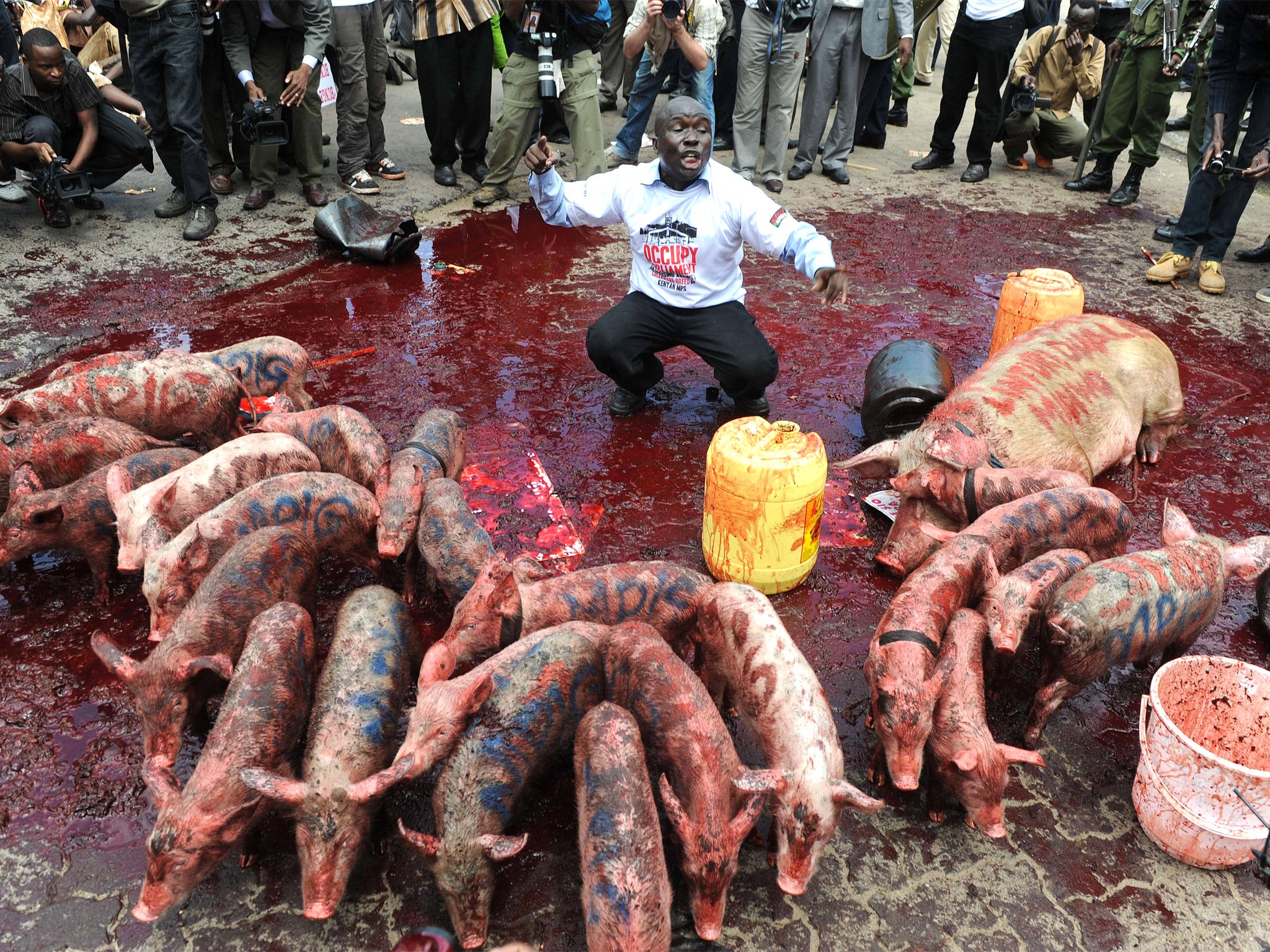Graffitied pigs and buckets of blood on the streets of Nairobi as protests over MPs' pay continue
Anger as lawmakers demand monthly rate of pay that is 131 times Kenya's minimum wage

Your support helps us to tell the story
From reproductive rights to climate change to Big Tech, The Independent is on the ground when the story is developing. Whether it's investigating the financials of Elon Musk's pro-Trump PAC or producing our latest documentary, 'The A Word', which shines a light on the American women fighting for reproductive rights, we know how important it is to parse out the facts from the messaging.
At such a critical moment in US history, we need reporters on the ground. Your donation allows us to keep sending journalists to speak to both sides of the story.
The Independent is trusted by Americans across the entire political spectrum. And unlike many other quality news outlets, we choose not to lock Americans out of our reporting and analysis with paywalls. We believe quality journalism should be available to everyone, paid for by those who can afford it.
Your support makes all the difference.Pigs were unleashed and blood poured on the streets of Kenya's capital, Nairobi, in a gorey protest against excessive pay for the country's MPs. Kenyan protesters let loose the pigs outside parliament as part of a mounting public backlash against efforts by new MPs to grant themselves an increase to their record-breaking salaries. Demonstrators poured buckets of blood onto a street in the city centre and let a pig and a litter of piglets feed on it. The animals were daubed with graffiti criticising lawmakers who want £6,540 per month or 131 times Kenya's minimum wage.
The protest was broken up by riot police — who earn roughly £100 per month — who fired teargas outside parliament and baton charged a peaceful crowd of about 250 people.
The piglets were meant to symbolise “the greed of the country's legislators,” said anti-corruption campaigners Boniface Mwangi who was among dozens of people arrested after the police broke up the demonstrations at the gates of parliament. It was the latest eye-catching stunt organised by group calling itself Occupy Parliament, “an uprising against collective greed of Kenya's MPs.”
Last month protesters marched to parliament carrying coffins to symbolise the impact on average Kenyans of the money-grubbing by the country's legislators.
Voters overwhelmingly backed a new constitution three years ago which set up a salaries commission to oversee the pay of public officials. The public body found that Kenya's MPs were among the best paid in the world and recommended their annual basic pay be cut from £78,500 to £51,650. Furious new lawmakers, elected in March, have demanded that the commission's findings be overturned and that they be given £45,000 to spend on luxury vehicles, as well as travel expenses, bodyguards and access to VIP flight lounges. The last parliament caused a storm in Kenya when it awarded itself a £70,400 retirement bonus earlier this year.
Despite being East Africa's biggest economy, the vast majority of Kenyans are employed in the informal sector and struggle to make even the £50 per month minimum wage. Kenya's expanded legislature includes 349 MPs and 67 senators. The public wage bill has exploded in recent years to account for 80 percent of recurrent expenditure while economic growth has lagged behind the sub-Saharan African average of five percent. A recent Harvard study said that without rampant corruption and bad governance Kenya would be growing by seven percent per year and be on course to become a middle income country by 2018.
Global graft watchdog Transparency International has Kenya among its worst performers in its annual index. The pay protests come one week after a Kenyan judge threw out a long-standing case the man accused of masterminding the Goldenberg scandal. The scheme saw vast payments made by the government as export credits for non-existent gold and diamonds. The main vehicle for the scandal was Goldenberg International, a firm set up by Indian businessman Kamlesh Pattni, against whom charges have now been dropped. Mr Pattni, who claims to be a preacher, recently underwent a conversion to Christianity and made a failed attempt to win a seat in parliament.
Join our commenting forum
Join thought-provoking conversations, follow other Independent readers and see their replies
Comments